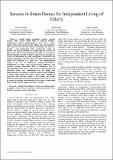Files in this item
Sensors in smart homes for independent living of elderly
Item metadata
| dc.contributor.author | Pirzada, Pireh | |
| dc.contributor.author | White, Neil | |
| dc.contributor.author | Wilde, Adriana Gabriela | |
| dc.date.accessioned | 2018-07-25T09:30:07Z | |
| dc.date.available | 2018-07-25T09:30:07Z | |
| dc.date.issued | 2018-04-25 | |
| dc.identifier | 252891442 | |
| dc.identifier | 2bc5f197-3831-4013-bb6b-50917d40cc48 | |
| dc.identifier.citation | Pirzada , P , White , N & Wilde , A G 2018 , ' Sensors in smart homes for independent living of elderly ' , Paper presented at International Multi-Topic ICT Conference 2018 , Jamshoro , Pakistan , 25/04/18 - 27/04/18 . | en |
| dc.identifier.citation | conference | en |
| dc.identifier.uri | https://hdl.handle.net/10023/15705 | |
| dc.description.abstract | A rapidly ageing population requires support systems which would enable them to preserve dwellers’ independence without compromising on their safety or their quality of life. Smart homes for the elderly have the potential to offer unobtrusive health and wellness monitoring. The aim is to provide a safe, independent living environment which can identify and predict problems by monitoring the activities of daily living (ADLs) of the inhabitants. For this, a system able to handle continuous streams of data is required. Such a system can extract the information by using appropriate classification and learning algorithms and thus allow the remote monitoring of health and wellbeing at a high level. The implementation requires: the use of appropriate sensing technologies, identification of ADLs, data pre-processing techniques and machine learning algorithms. This is challenging due to individual differences: such a system must be able to personalize individual needs. Our contribution was the design and implementation of a platform to smartly monitor health condition of elderly using sensor data from a smart home, through an interactive user interface which is user-friendly and multi- platform. This proof-of-concept used off-line data, with the view to extend to real-time data collection in the future, which could then be used to inform support providers remotely. | |
| dc.format.extent | 8 | |
| dc.format.extent | 622082 | |
| dc.language.iso | eng | |
| dc.subject | Elderly | en |
| dc.subject | Smart Homes | en |
| dc.subject | Activity recognition | en |
| dc.subject | Unobtrusive monitoring | en |
| dc.subject | Health Care | en |
| dc.subject | Machine Learning | en |
| dc.subject | Learning Algorithms | en |
| dc.subject | QA75 Electronic computers. Computer science | en |
| dc.subject.lcc | QA75 | en |
| dc.title | Sensors in smart homes for independent living of elderly | en |
| dc.type | Conference paper | en |
| dc.contributor.institution | University of St Andrews. School of Computer Science | en |
| dc.description.status | Peer reviewed | en |
This item appears in the following Collection(s)
Items in the St Andrews Research Repository are protected by copyright, with all rights reserved, unless otherwise indicated.

